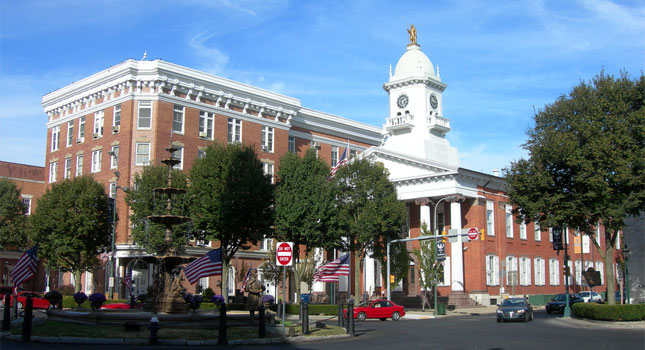 Taking their cues from the National Rifle Association, right-wing media are pointing to a mayoral election in a tiny town in central Pennsylvania as a rebuke to the gun violence prevention movement. In reality, the victorious pro-gun candidate won by a margin of only 167 votes in a Republican town after spending more than six times as much as the losing incumbent.
Taking their cues from the National Rifle Association, right-wing media are pointing to a mayoral election in a tiny town in central Pennsylvania as a rebuke to the gun violence prevention movement. In reality, the victorious pro-gun candidate won by a margin of only 167 votes in a Republican town after spending more than six times as much as the losing incumbent.
On November 5, Pete Lagiovane, the mayor of Chambersburg, PA, was defeated for re-election by Darren Brown, a veteran of the wars in Iraq and Afghanistan and a student at Shippensburg University.
The NRA painted the election as “a huge victory for Second Amendment supporters and sportsmen in Chambersburg” because Brown had promised not to join Mayors Against Illegal Guns, a coalition of more than 1,000 mayors that had included Lagiovane. That talking point was picked up this week by Pittsburgh Tribune Review columnist Salena Zito, who said that Lagiovane had lost “in part because he signed up Chambersburg as one of New York Mayor Michael Bloomberg's anti-gun cities” and thus "[w]hat happens in New York City usually can only happen in New York City, and is best kept there." RealClearPolitics and Breitbart News have since amplified Zito's claims.
In fact, there are a number of other factors that explain Lagiovane's defeat that have nothing to do with the candidates' positions on guns.
Partisanship. 46 percent of registered voters in Chambersburg are Republicans, compared to 39 percent that are Democrats, giving Brown a substantial built-in advantage. Lagiovane won his last election in 2009 by running unopposed. The position pays $5,600 a year for roughly 30 hours of work a month and has little power -- Brown's top campaign promise appears to be creating a series of YouTube videos to highlight local businesses.
Turnout. Brown won the election by a margin of 1,429 to 1,262. The local paper noted that “Democrats failed to get out the vote” for the election, with turnout in the three Chambersburg voting precincts where Democrats outnumber Republicans running at 16, 16, and 11 percent, the lowest in the town. Only 400 people in the town's most ethnically diverse precinct voted; 1,700 voted in the presidential election. It likely did not help Lagiovane that Eugene Rideout, his African-American opponent in the Democratic primary, ran a write-in campaign in the general election that was built around one of Martin Luther King's sermons.
Spending. As of a week before the election, Brown's campaign had spent $6,700 on the election (with more than $500 left in the bank), compared to “less than $1,000” from Lagiovane. According to the local paper, “a candidate typically spends a few hundred dollars to run a mayoral campaign.” The additional funds allowed Brown to blanket the town with banners, yard signs, and pamphlets. That spending aided Brown's extensive door-to-door campaign, which he credited with the win.
Media have frequently sought to portray narrowly-won, low-turnout elections as major defeats for gun violence prevention and have for decades promoted the myth of the NRA's electoral supremacy.
Image via flickr via Creative Commons License